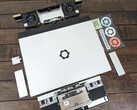In addition to repairability and the ability to upgrade most components after purchase, the modular ports are perhaps the biggest advantage of the Framework Laptop, allowing users to choose a combination of ports such as USB-C, USB-A, HDMI, Ethernet and an SD card reader, even after purchase. Framework also offers other practical modules for these expansion slots, such as an SSD.
Creative users can also use these slots in other ways, such as the new Brick System Expansion Card, which user @bonkrat_1142785 published on Printables. This expansion card can be made using a 3D printer. Its only purpose: the four pins on the outside and the pins on the bottom are compatible with Lego, allowing the Framework Laptop to be expanded with a range of interesting extensions.
One of the more interesting examples are the small feet that allow for elevation of the base of the laptop. This has two advantages - elevation of the base can improve the ergonomics of the keyboard and at the same time benefit cooling, as the ventilation openings on the underside of the laptop have significantly more room to "breathe".
The manufacturer also showcases a Lego arm that can hold a headphone cable, for example, as well as wheels, which occupy all four ports of the Framework Laptop 13 in order to hold the laptop - this idea would work better with the Framework Laptop 16 and its six ports. With these ideas, the Framework community proves once again that laptops can not only be functional, but also fun, because if you have a 3D printer, you can also attach a fidget spinner or a slingshot to a Framework Laptop.































